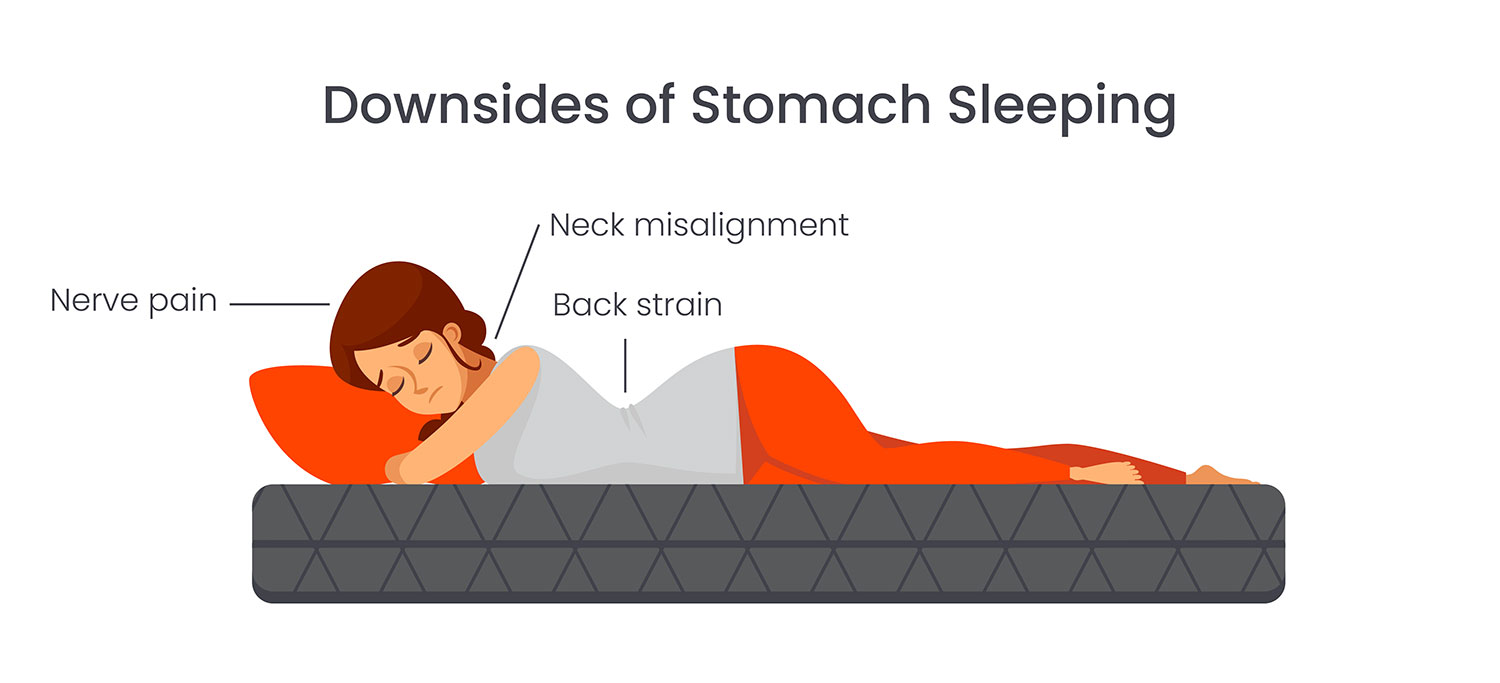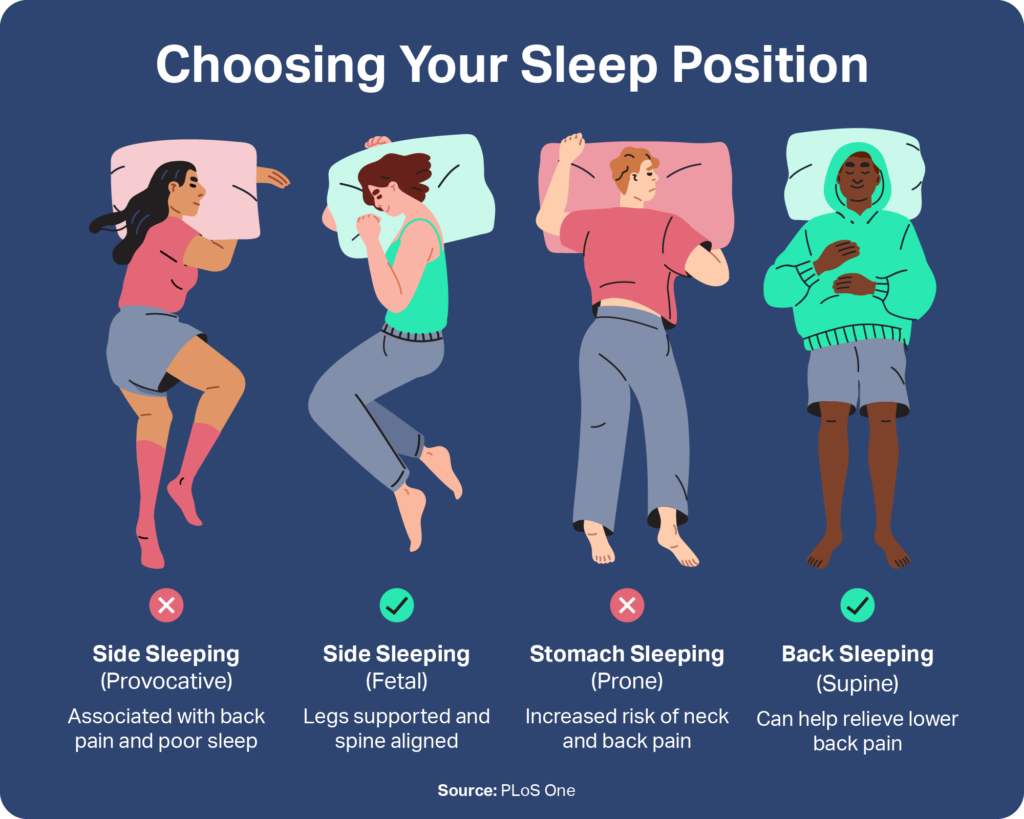Have you ever woken up with a stiff neck or an aching back and wondered why? If you’re someone who loves to sleep on your stomach, this might be the culprit.
While it may feel cozy and comforting at first, sleeping on your stomach can lead to a host of issues that can affect your health and well-being. You might not realize it now, but your favorite sleeping position could be silently sabotaging your sleep quality and causing discomfort.
Curious to know how this happens and what you can do about it? This article will unravel the hidden reasons why sleeping on your stomach is bad and offer insights into how you can make changes for a healthier, more restful sleep. Stick around to discover how simple tweaks can lead to a more rejuvenating night’s sleep, allowing you to wake up refreshed and ready to conquer the day.
Impact On Spine Alignment
Sleeping on your stomach can cause poor spine alignment. This position puts pressure on your neck and back. Over time, it may lead to discomfort and stiffness. Opting for a different sleeping position can help maintain a healthy spine.
Sleeping on your stomach might feel comfortable at first, but it can have a significant impact on your spine alignment. Your spine is designed to maintain a natural curve, which helps distribute your body weight evenly and prevents pain. When you sleep on your stomach, this alignment can be disrupted, leading to discomfort and potential long-term issues.
What Happens To Your Spine?
When you lie on your stomach, your spine is forced into an unnatural position. Your neck is often turned to one side, which can strain the muscles and joints. This can result in waking up with a stiff neck or even headaches.
Pressure On The Lower Back
Sleeping on your stomach can put extra pressure on your lower back. Your spine is not supported, causing your back to arch unnaturally. This position can lead to lower back pain that may persist throughout your day.
Impact On Nerve Function
Your spine houses nerves that control various functions in your body. Misalignment due to stomach sleeping can compress these nerves. This compression might cause tingling or numbness, especially in your limbs.
Challenges In Breathing Comfortably
When you sleep on your stomach, your chest is compressed against the mattress. This position can make it harder for you to breathe deeply and comfortably. Over time, shallow breathing might affect your sleep quality and energy levels.
Ways To Improve Your Sleep Posture
Consider transitioning to a side or back sleeping position to support your spine better. Use a firm pillow to keep your neck aligned with your spine. If you find it hard to change your sleeping habits, try placing a pillow under your pelvis to reduce strain on your back. Have you ever wondered why you wake up feeling achy or tired? Your sleeping position might be the culprit. Experiment with adjustments to find what best supports your spine and enhances your sleep quality.

Credit: laylasleep.com
Neck Strain And Discomfort
Sleeping on your stomach can lead to neck strain and discomfort. This position forces the neck into awkward angles, causing muscle tension. Over time, this can contribute to chronic neck pain, making it harder to find relief. Consider changing your sleeping posture for better neck health.
Sleeping on your stomach might seem like a cozy way to drift into dreamland, but it can lead to unexpected issues, particularly for your neck. When you lay face down, your neck is forced into an unnatural position, causing strain and discomfort. This can lead to morning stiffness and even chronic pain, affecting your daily life.
Understanding The Strain On Your Neck
Your neck is designed to support your head in a balanced position. When you sleep on your stomach, you must turn your head to the side to breathe. This twist puts undue stress on your neck muscles and joints. Imagine holding your head turned to one side for hours while awake. It would be tiring and painful. Now, consider doing that every night while sleeping. It’s no wonder stomach sleepers often wake up with neck pain.
Impact Of Prolonged Neck Discomfort
The effects of neck strain don’t just disappear when you get up. Persistent discomfort can lead to headaches and even affect your posture. Over time, you might find yourself holding your head awkwardly during the day, trying to relieve the tension. Have you ever wondered why your neck feels stiff even after a full night’s sleep? It might be your sleeping position causing the problem. By sleeping on your stomach, you are inadvertently setting yourself up for a day of discomfort.
Practical Tips To Alleviate Neck Strain
Shifting to a different sleeping position can significantly reduce neck strain. Try sleeping on your back or side, which keeps your spine in a more natural alignment. If you’re committed to stomach sleeping, use a thin pillow or no pillow at all to minimize the angle of your neck. Investing in a supportive mattress can also help distribute your body weight more evenly. Have you ever tried a different pillow and noticed less neck pain? Sometimes, small changes can make a big difference. Consider incorporating gentle neck stretches into your routine to alleviate any existing tension. Stretching can increase flexibility and help your neck muscles relax. Are you ready to say goodbye to morning neck pain? Changing your sleeping habits could be the key.
Pressure On Internal Organs
Sleeping on your stomach might seem comfortable at first. But it can cause pressure on internal organs. This position can lead to several health issues over time. Your body needs a position that supports all vital functions. Let’s explore how stomach sleeping impacts your organs.
Pressure On Your Heart
Stomach sleeping can press on your heart. This pressure can make blood flow harder. Your heart works harder to pump blood. This might cause increased heart strain.
Impact On Your Lungs
Your lungs are not free to expand fully. Sleeping face down restricts lung expansion. This reduces oxygen intake. Breathing becomes shallow and less effective.
Stress On Your Digestive System
The stomach lies under pressure in this position. Digestive processes might slow down. It can lead to discomfort and indigestion. Your stomach needs space to work properly.
Effect On Your Liver
Stomach sleeping can pressure the liver too. Your liver has a key role in detoxifying. Constant pressure may affect its function. This might impact its efficiency over time.
Strain On Your Spine
Spinal alignment is crucial for health. Stomach sleeping twists your spine. This misalignment causes stress on organs. Proper spine position ensures organ health.
Breathing Difficulties
Sleeping on your stomach might seem comfortable. But it can cause breathing issues. This position forces your head to turn sideways. It compresses your airways, making it hard to breathe smoothly.
Your lungs and diaphragm may not function well. The pressure on your chest restricts airflow. This reduces oxygen intake, affecting your sleep quality.
How Stomach Sleeping Affects Your Airways
Stomach sleeping can flatten your chest. This reduces space for your lungs to expand. The pressure on your windpipe can cause breathing trouble. You may wake up feeling tired or out of breath.
Impact On Oxygen Levels
Reduced airflow means less oxygen reaches your body. This impacts your brain and muscles. You may feel groggy or weak during the day. A lack of oxygen can also disturb your sleep cycles.
Risk Of Snoring
Sleeping on your stomach can increase snoring. The airway pressure makes breathing noisier. It can disrupt your sleep and disturb others.
Long-term Health Concerns
Constant breathing issues can lead to problems. It may cause sleep apnea or worsen asthma. Long-term effects include fatigue, poor concentration, and mood swings.
Risk Of Developing Pain
Stomach sleeping increases the risk of neck and back pain. It puts extra pressure on the spine and muscles. Breathing can also become difficult, causing discomfort.
Sleeping on your stomach might feel comforting, but it can lead to unwanted aches and pains. The position often twists your neck and spine into awkward angles. Over time, this can cause discomfort and strain on your body, particularly in your neck and back.
Neck Strain
When you sleep on your stomach, your neck is forced to turn to one side. This unnatural position can lead to stiffness and pain. Imagine keeping your head turned to one side for hours during the day. It wouldn’t feel great, right? Over time, this can lead to chronic neck pain or even conditions like a herniated disc. If you wake up with a sore neck, it might be time to reconsider your sleeping position.
Back Pain
Lying flat on your stomach can also cause your spine to arch in an uncomfortable way. This can put pressure on your lower back, leading to pain or discomfort. If you often wake up with a sore back, your sleeping position might be to blame. A friend of mine struggled with back pain for years until they switched to sleeping on their side with a pillow between their knees. They noticed a remarkable difference.
Shoulder Pain
Sleeping on your stomach can cause one shoulder to bear more weight than the other. This imbalance can lead to shoulder pain or tension. If you’ve ever felt like one shoulder is tighter than the other, your sleeping habits might be contributing. Try adjusting your position to give your shoulders a break.
Hip Discomfort
Your hips might also pay the price for stomach sleeping. This position can cause your hips to sink into the mattress, creating misalignment and discomfort. Over time, this can lead to hip pain or even affect your gait. Consider how your hips feel in the morning and whether they’re trying to tell you something.
Consider The Long-term Effects
Have you thought about the long-term effects of sleeping on your stomach? Chronic pain can affect your daily life, making it harder to enjoy activities you love. Switching positions might seem challenging, but your body will thank you in the long run. Making small adjustments now can prevent bigger issues later. Why not start experimenting with new positions and see if you notice a difference in how you feel each morning?

Credit: www.sleepfoundation.org
Effects On Sleep Quality
Sleeping on your stomach might seem comfortable at first, but it can have a negative impact on your sleep quality. You might wake up feeling more tired than refreshed. Let’s explore how this position affects your rest and what you can do about it.
When you sleep on your stomach, your internal organs experience increased pressure. This can lead to discomfort and disrupted sleep. Imagine waking up in the middle of the night because you’re struggling to breathe comfortably or feeling bloated.
Restricted Breathing
Your breathing can become restricted as your lungs have less room to expand. This might lead to shallow breathing, causing you to wake up frequently. Think about how waking up gasping for air would affect your energy levels the next day.
Increased Tossing And Turning
Stomach sleepers often find themselves tossing and turning throughout the night. This constant movement can prevent you from reaching the deeper stages of sleep. Ask yourself how restful your sleep really is if you’re constantly shifting positions.
Misalignment Of Spine
Your spine is forced into an unnatural position when sleeping on your stomach. This misalignment can cause pain and stiffness, interrupting your sleep. Consider whether waking up with back pain is worth the few moments of comfort.
Strain On Neck And Shoulders
Sleeping face down requires you to turn your head to one side, putting strain on your neck and shoulders. This can lead to soreness and headaches, affecting your overall sleep quality. Reflect on how often you wake up with a stiff neck.
Improving your sleep quality is possible by changing your sleeping position. Experiment with sleeping on your back or side for a more restful night. You deserve to wake up feeling refreshed and ready to take on the day.
Alternatives To Stomach Sleeping
Stomach sleeping can strain the neck and spine, causing discomfort. Try side sleeping to align the body naturally. Back sleeping also supports the spine and reduces pressure points, promoting better sleep quality.
Switching from sleeping on your stomach can significantly improve your sleep quality and overall health. Many people find themselves waking up with aches and pains, unaware that their sleeping position might be the culprit. If you’re ready to make a change, there are several comfortable and supportive alternatives to consider. These options can help you wake up refreshed and pain-free. But what are the best sleeping positions, and how do you transition smoothly?
Try Sleeping On Your Back
Back sleeping is often recommended by sleep experts for its health benefits. It allows your spine, neck, and head to rest in a neutral position, reducing the risk of discomfort. To ease into this position, try placing a pillow under your knees to maintain the natural curve of your lower back.
Side Sleeping With A Twist
If back sleeping feels too unfamiliar, consider side sleeping. This position is great for reducing snoring and sleep apnea. To make it more comfortable, place a pillow between your knees. This can help align your hips and reduce lower back strain.
Using A Body Pillow
A body pillow can be a game-changer for those struggling to ditch stomach sleeping. It provides support and comfort, making it easier to adjust to a new position. Hug the pillow as you sleep on your side or back, and notice how it helps prevent you from rolling onto your stomach.
Invest In The Right Mattress And Pillows
Your mattress and pillows play a crucial role in supporting new sleep positions. A medium-firm mattress can provide the right balance of support and comfort. Choose pillows that keep your head in line with your spine, preventing neck strain.
Practice Mindful Relaxation Techniques
Changing sleep positions can be challenging, but relaxation techniques can help. Deep breathing or meditation before bed can ease tension and make it easier to adjust. Ask yourself: Is my current sleep routine aiding my transition, or is it time for a change? Making these adjustments might take time, but the benefits to your health and comfort are worth the effort. Remember, small changes can lead to significant improvements in your sleep and well-being. Why not give these alternatives a try tonight?

Credit: purple.com
Frequently Asked Questions
Why Is Sleeping On Stomach Unhealthy?
Sleeping on your stomach can strain your spine and neck. This position may lead to discomfort and pain over time. It can also restrict proper breathing and cause misalignment in your body. Try sleeping on your back or side to reduce these risks and improve overall sleep quality.
Does Stomach Sleeping Affect Spine Alignment?
Yes, stomach sleeping can negatively impact spine alignment. This position often forces your neck into an awkward angle. It can also flatten the natural curve of your spine, leading to discomfort. Proper alignment is crucial for preventing pain and ensuring restful sleep.
Can Stomach Sleeping Cause Neck Pain?
Stomach sleeping can cause neck pain due to awkward positioning. This position strains neck muscles and ligaments, leading to discomfort. Over time, it can result in chronic pain or stiffness. Switching to back or side sleeping may help alleviate these issues and promote better neck health.
Is Breathing Affected By Stomach Sleeping?
Stomach sleeping can restrict breathing because of pressure on your chest. This position compresses airways, making breathing less efficient. It may disrupt sleep quality and reduce oxygen intake. Opt for back or side sleeping to enhance breathing and improve overall sleep health.
Conclusion
Sleeping on your stomach can harm your body. It puts pressure on your spine. This may lead to neck and back pain. You might also breathe poorly. Bad breathing affects sleep quality. Your joints can suffer too. It’s wise to change sleep positions.
Try sleeping on your back or side. This can improve your health. Better sleep means a better day. Consider these points for restful nights. Your body will thank you. Remember, small changes can make big differences. Always prioritize your comfort and well-being.
Sleep well and stay healthy.
